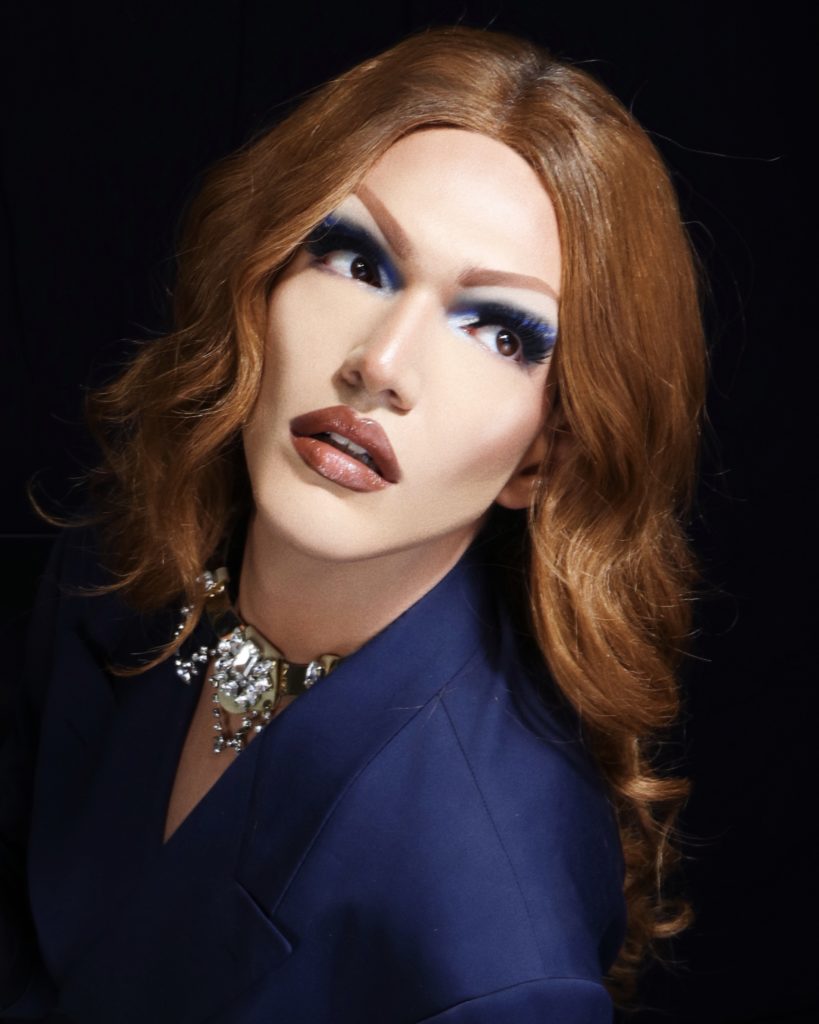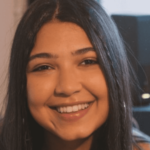I met Sultana long before she existed, both of us at the precipice of adulthood. We were actors in a local university play, a rendition of the 1948 American thriller Sorry, Wrong Number. Directed by mutual friends and starring strangers we met, loved, and departed shortly after, the cast shared memories of rehearsals behind the Gulbenkian’s heavy curtains and meditative practices on its stage. Sultana, who had yet to show her face, carried a palpable presence into the amphitheater that I could never shake off, even long after I left Lebanon.
Years later, standing two meters tall, Sultana towers over the city in stilettos and wears lashes that fan out the dust in her eyes. She laughs as she remembers her first time walking down Hamra Street in a wig.
“It would be glorifying the wig if I described it as plastic.”
It was Halloween in 2016, she got ready at the same theater where we first met. On this particular night, she presented as a young man with a clean-shaven face and a borrowed dress hanging from his shoulders. She left campus with her head bowed, averting curious gazes and inspecting eyes, trying hard not to draw any more attention to herself.
It’s now afternoon in Beirut and Sultana lights a cigarette, gesticulating her hands theatrically as we go over the pivotal moments of her short past. We don’t have much time to talk because she’s hosting a dinner for her friends. I tell her we can reschedule for another day to give her more time to prepare, but she reassures me that she’ll manage. “Cooking is actually therapeutic for me. I don’t stress it.”

At the start of our Zoom call, I ask her if she remembers me well, it’s been six years and we’re embarrassed by age. I gush about my admiration of her work, which I’ve closely followed since she first created an Instagram account, marking Sultana’s digital introduction into Beirut’s growing Drag scene. She responds humbly, crediting her courage to the trailblazers who paved the way for her: Bassam Feghali, Evita Kedavra, and the bubblegum campiness of Haifa Wehbe and Lady Madonna.
Once pleasantries are exchanged, I am reminded instantly that Sultana knows how to make you feel like an old friend, always welcomed into her world, a world that she constructed with her bare hands. As visitors, we can watch but not touch, question but not probe. This is the delicate art of performance—one that Sultana is determined to master, by whatever means necessary.
“I always want to look polished, there’s a standard for Sultana that represents my skills as a makeup artist. Despite the costs, I always save up for her––ask anybody I know. I went two years without buying anything for myself, I was always repurposing clothes or items that I already owned. [Sultana’s] not just a creative outlet [for me], but also an emotional and spiritual one.”
“I ping-pong between masculinity and femininity. There’s a dichotomy in those expressions [that] exist in who I am. Growing up, I played basketball but I also enjoyed applying concealer. Of course, I told my parents it was to cover up acne spots. Sultana is [simply just that]: sometimes my extreme opposite, or just a heightened expression of myself.”
A quick scroll through Sultana’s Instagram feed displays a fierce commitment to her craft. Angled cheekbones and pouty lips are held high on a slim frame complimented by miniskirts and corsets, ballgowns and kimonos. From platinum blonde bobs and mullets to a raven bouffant, each photo is meticulous in lighting, design, and execution. In one video produced for My.Kali, a MENA-based webzine that empowers “youth to defy mainstream gender binaries in the Arab world,” she dances to a Nicki Minaj/Marwa mash-up, paying homage to the Barbz and MelodyHits, a relic of Arabic pop music.
Sultana also often posts about her grandmothers, whom she had lived with after she was outed to her family. With no money for rent or food, she was welcomed in their homes. She shares photos of them on her personal Instagram, reminiscent of the glory and beauty that tints the past with sepia hues and bright white pearls, fur coats and crinoline tulle dresses.
“Femininity, in my opinion, is a performance of strength. I come from a family where the women faced their struggles with makeup on, their hair rollers pinned, and I resonated with that as a child.”
Her WhatsApp profile picture caught my attention when I first messaged her. I only know Sultana within our limited interactions on Instagram, and I was expecting an editorial photo, draped in high fashion and glitter, staying true to her digital aesthetic. Instead, the photo is cropped vertically to emphasize a grandmother in a black turtleneck and olive-green blazer balancing her grandson on her lap. She looks at him dotingly, the frame frozen on this moment that cannot be interrupted. Even without mutual understanding, there can be love.
“I watched [these women] behind closed doors, I watched what they [went] through, and recognized how they dealt with their loved ones and the reciprocity that can be found in that.”
Sultana continued to search for job opportunities, refusing to distort herself again for the comfort of others. I hesitate to ask her what she means by ‘again,’ a subtle insinuation that she has found herself in this place before. She clarifies immediately, recalling the first time her parents discovered the truth about her sexuality, promising to lend their support only if she agreed to visit a psychologist. “[The psychologist] told me that being gay was a marketing plan [shipped over] from the United States. I responded: “If that were true, then where’s my check?”
Soon after, she found work as a makeup artist for films, commercials, and plays, working with Lebanese director Aliya Khalidi, Vogue Arabia, and French Montana. She adapted to their production as she went along, contouring Sultana’s public image in the reflection of her ambitions. She turns her phone to the screen and shows me a photo of herself taken at the Beirut Vogue Mini Ball in 2019. Her acrylics are red and her wig is auburn, accentuating a bodice shaped by golden leaves that waterfall into a cinched skirt; it draws to mind illustrations of Greek goddesses found in children’s folklore.
“I made that. It took me 14 hours. I cut each strap of lace and glued it onto the silhouette and sewed the feathers myself. In Drag, you’re a designer, you’re a hairstylist, a makeup artist. [It is] about resourcefulness, using products at hand. But most importantly, you have to be imaginative.”
Sultana pays homage to a particular form of femininity, one that we are expected to abandon in our departure from the patriarchal world. When asked about whether Drag teeters on a caricature of womanhood, she tells me that the irony of the gender construct is displayed through Drag. Who is entitled to wear makeup? What attributes of the self are inherently masculine or feminine? What physical traits or wardrobe elements define our gender? In performing womanhood, with all of its beauty and grace, Sultana shows us that gender does not exist on a binary spectrum––it is what we make of it.
“I ping-pong between masculinity and femininity. There’s a dichotomy in those expressions [that] exist in who I am. Growing up, I played basketball but I also enjoyed applying concealer. Of course, I told my parents it was to cover up acne spots. Sultana is [simply just that]: sometimes my extreme opposite, or just a heightened expression of myself.”
Read Also:
Throughout the conversation, Sultana mentions her chosen family, a phrase used universally by members of the LGBTQ+ community. In Lebanon, these communities coalesce into intimate spaces that have been passed along by their predecessors. The stretch from Mar Mikhael to Karm El Zaytoun is a pocket of Beirut where bars and pubs are sheltered by arched windows and mosaic domes, finding solace amongst buildings cramped up against each other. Its occupants and visitors are relatively safe from harm or prosecution, once marking it as a beacon of tolerance and hope, even long after the August blast deprived them of their livelihoods and their refuge.
There’s also Bardo. Tucked away on Beirut’s Mexico Street, to the right of Thai classic Jaï, the café/bar was Sultana’s “home when home was not one.” Bardo was everything all at once: a stage, a study lounge, and a catch-up spot; it is one of the few places in the city where everybody was welcomed, gleefully embraced by its management. When it was announced that its doors would shut due to the country’s deteriorating economy, citizens across the country and the region mourned as they shared fond memories of their time in its dimly lit bar where DJs and Drag Queens performed alongside each other. Another institution lost in the avalanche of our collapse.
“Oh, and Burj Hammoud! It’s the heaven of Drag: anything you want, anything that sparkles, loud, tacky, colorful. It’s all there, give it to me.”
Mapping out the city with Sultana as a guide displays a version of Beirut that has made an indelible mark on the region’s cultural landscape. She shows gratitude to the Queens that came before her and the ones that stood beside her. When TikTok or Instagram users comment on her posts, scrutinizing her choices, contemptuous and disgusted by the image of herself that she so artfully curates, she redirects the hatred back at them: why are you choosing to care?
“We’re not victims––as a Drag Queen, I’m strong. Yes, we have a lot of hardships compared to [Drag Queens] across the globe. Would I like to be in LA and do drag? It would be safer, but I’d rather do it here and have it be meaningful. I’d love to be there when Drag becomes acceptable, open, and casual.”
Before I hung up, I realized that I forgot to ask Sultana where she was from, having assumed she was Lebanese until I remembered a placard she held during the October 2019 uprisings, condemning the government for not allowing her mother to pass on her nationality.
“I’m a great collaboration of Arabs. Lebanese, Jordanian, and Syrian. I wish just one of those passports was of any use.”
Life can be both glamorous and humorous for us all, and like a well-kept secret passed along the generations that have paved the way, Sultana knows this all too well. The boundaries of our self-expression only exist if we choose to abide by them––and she’s chosen freedom.
Read Also:






